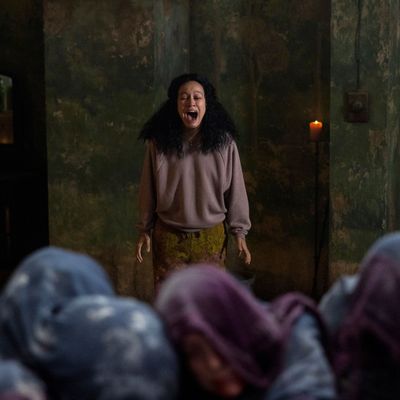
“Witch” is the first episode of The Midnight Club since the premiere to feature two narrated stories, surpassing even the last episode in terms of screen time devoted to storytelling. But since both stories are told at the beginning of the episode, getting them out of the way early makes for interesting pacing, with the meat of the plot of this installment going to the most streamlined, high-stakes, moving storyline yet.
First, the episode continues Kevin’s ongoing story about Dusty, the teenage serial killer. He’s still murdering teen girls on his mom’s orders, and his killings are becoming more frequent despite the detective slowly learning more about the perpetrator’s profile. While on a date with Sheila, Dusty tries to protect her from himself, telling her she deserves better, but he’s powerless to her kiss. Sure enough, his mom orders him to kill Sheila next. That’s where the story ends for now.
Ilonka suggests a double story, introducing a witch named Imani (played by Ilonka). Imani and her doctor mother (played by Ilonka’s foster mom Maggie in her first real appearance) are both healers, but they can also see the future. When Imani’s mom sacrifices her life to save a teenage girl, Imani breaks her rule of no scrying at night and sees a vision of a boy getting shot by a liquor store robber.
Imani meets that very boy later that evening in a setup orchestrated by her friends (played by Anya, Spence, and Cheri). His name is Ben (played by Kevin, duh), and she falls for him immediately. Her vision threatens to come true when they pull up to the familiar liquor store; she convinces Ben not to go in but Scottie (Anya) goes instead. Sure enough, she gets shot, and Imani feels guilty even as she keeps dating Ben. The universe has a way of course-correcting in extreme ways: Imani and Ben then witness a second armed robbery, one that could finally claim Ben’s life like the universe originally intended.
But before Ilonka can finish her story, Anya passes out right on the desk and the story is dropped entirely. There are much more pressing matters to address, both at Brightcliffe and on a narrative level; as always, though, it’s worth taking a moment to look at what Kevin and Ilonka’s stories tell us about them (besides the fact that their latent attraction to each other may be growing).
Kevin’s story is the weaker of the two, a sequel that doesn’t actually elucidate much we don’t already know. But I like what we see of Ilonka’s story, which clarifies her self-conception as the group healer. While everyone else has accepted their state of affairs, Ilonka is still focused on some far-off hope of keeping them alive. At the start of the series, Dr. Stanton said Brightcliffe wasn’t about going to battle against illness, and that philosophy appealed to Ilonka. But part of her was thinking even then about the miraculous story of Julia Jayne, and how she could possibly replicate it to save herself.
That may indeed be possible. But The Midnight Club always reserves a little skepticism for Ilonka’s unorthodox remedies, and that reaches a new level in “Witch.” When everyone discusses Anya’s life-threatening sepsis in group therapy, Ilonka is stunned by the other patients’ apparent willingness to go gentle into that good night. “I’m waiting on cancer with a Molotov and a machete,” she says, and in the moment, you can get swept up in her determination.
But that’s the thing: The metaphor of fighting cancer with weapons can be helpful in hyping you to push forward, but it’s deeply flawed. Ultimately, your body’s reaction to a virus has little to do with bravery or toughness, and there’s little you can do to swing the odds in your favor outside of finding good medical care. Pretending otherwise is a fantasy of control. That’s what Dr. Stanton tries to explain to Ilonka in therapy. “People can become so obsessed with beating death that they ruin their lives,” she warns. “How are you going to feel if you spend so long fighting, you don’t take a moment to say goodbye?”
Stanton might as well be the scryer in that moment, because by the end of the episode, it’s possible Ilonka has done exactly what Stanton cautioned her against. There’s a time when it seems like the doc got through to her; Ilonka does make an effort to quietly be there for Anya when she visits her in the recovery wing. “If you have to leave, I guess I will try to make peace with that,” she says. But when she asks what Anya’s regained consciousness indicates about longevity, she can’t bear Stanton’s ambiguous answer. Stanton points out the impossibility of fighting gravity and the value in meeting cancer on its terms — what matters is feeling gratitude for each moment and recognizing Anya’s recovery as a win, no matter how temporary. But this genuinely inspiring wisdom is too brutal to consider for Ilonka, who needs to retain some measure of control.
Fortunately or unfortunately, she runs into the devil on her shoulder, Shasta, who uses a silly bug metaphor to “disprove” Stanton’s gravity thesis and offers to help Ilonka try to heal Anya. This is the first time in the series I actively distrusted Shasta, even if there were always red flags; she seems too eager for Ilonka to do the ritual, and her gradual transition from benign naturopathic healer to normalizer of blood rituals reminds me of what happened with Aceso.
The ritual Shasta suggests requires the blood of five women, like the Five Sisters, so she offers her own in addition to Ilonka, Sandra, Natsuki, and Cheri’s. Ilonka manages to gets everyone onboard pretty quickly, all things considered; Sandra is the only holdout, for predictable reasons. She has a point when she says the spiritual world is about saving souls, not bodies. Still, Natsuki gets through to her when she asks her to just “show up,” demonstrating an uncommon sensitivity toward Sandra’s efforts to include people in her faith.
But there’s another reason Sandra joins the ritual last-minute: She dreamed of Ilonka being swarmed by hooded figures in the basement. She urgently asks if there was anything weird when Ilonka arrived; Ilonka did, in fact, see a message written in sheets on the floor reading “DON’T” after sneaking Anya to the basement. But Ilonka lies, intent on proceeding with the original plan. Nothing will deter her from her goals now, as foreshadowed earlier in the fantastical yet similarly rash healer version of herself.
Everyone around the fire offers personal sacrifices, some of which are poignant and some of which are too vague or cryptic to yet understand. Each of them draws blood and leaves a bloody thumbprint on Anya’s forehead, leading to a small but very moving moment when Spence assures her, “You know that you can’t get it this way, right?” (alluding to his AIDS diagnosis) and she replies, full of love, “I wouldn’t care even if I could.”
In general, there’s a palpable sense of love in this core group dynamic, and that makes this ensemble enjoyable to watch, even when the show’s pace is a little too leisurely and its emotional beats a tad too treacly. When Ilonka pours cold water on Anya’s head and they all resume their chanting, the camera centers on Anya’s face, her desperate pleas for “just a little longer.” You want it for her, and you want it for all of them.
That makes the possibility of the ritual backfiring all the more tragic. It’s hard to say for sure what the end of “Witch” means; Anya isn’t necessarily gone, but the encroaching shadow seems stronger and hungrier than ever, perhaps accelerated by Ilonka’s ritual (including the splash of cold water) rather than slowed down. Cancer may not be about winning or losing, but in light of Ilonka’s healing fantasy and her difference of philosophy with Stanton over the course of this episode, failing Anya feels like the biggest loss of all.
Scary Stories
• Tempted to give this one five stars, but there’s something that still isn’t truly clicking for me yet. I think this show is capable of better, and hope it finds it in the final four episodes.
• Shasta has an hourglass symbol on her wrist, which she identifies as “something older than the Paragon.” Waiting for a Shasta identity reveal any day now.
• I never have trouble with blood and gore, but I always find it viscerally difficult to watch people slice their wrists or hands, both of which happen a lot in The Midnight Club. I know all these teens are dying, but are they all really so comfortable and confident slicing open their palms without hesitation? That would be a big sticking point for me.


